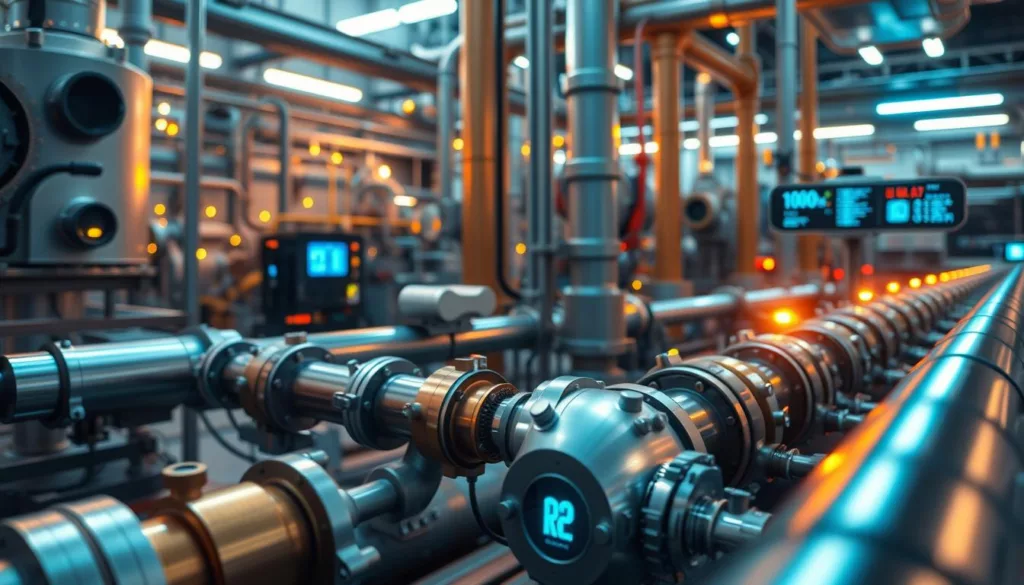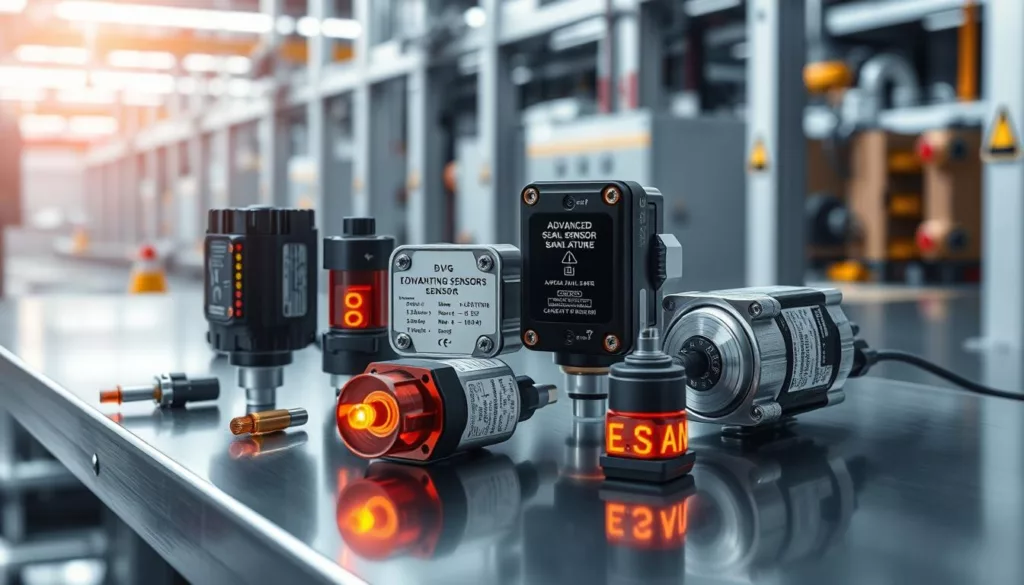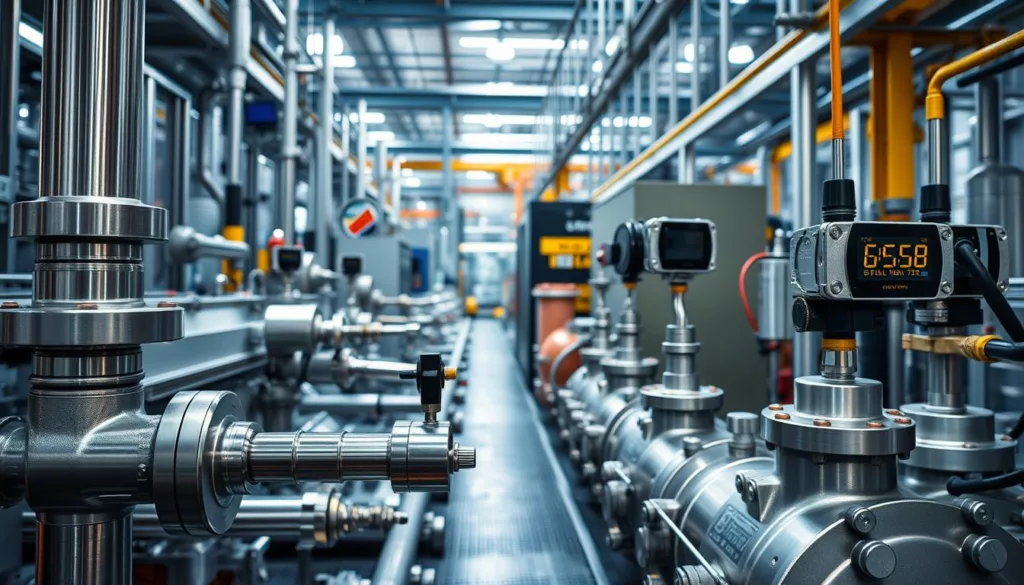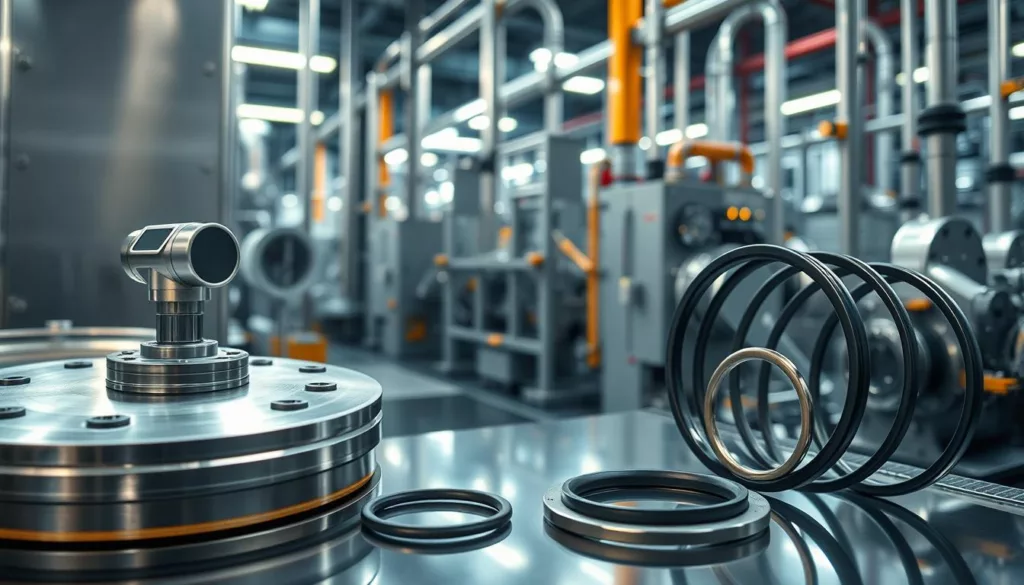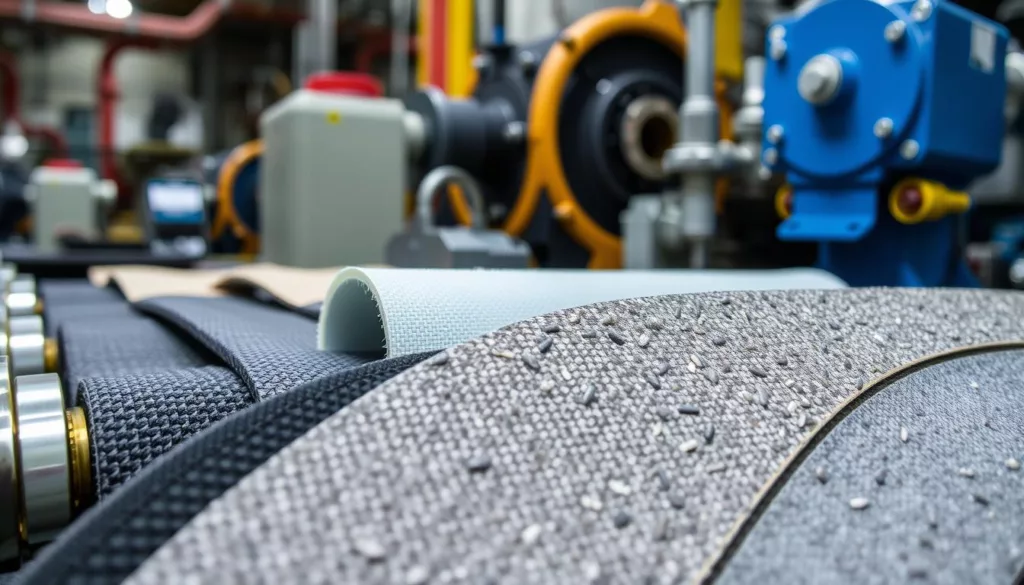Today, the world of manufacturing is changing fast. Industrial sealing sensors are at the heart of this change. These devices are key to keeping processes tight and efficient, allowing businesses to step up their game with smart solutions.
We focus on delivering top-notch industrial sealing sensors. These harness the latest in sealing technology to tackle various industry hurdles. By grasping how these sensors work, companies can boost reliability and dodge mishaps in their manufacturing lines.
We’re here to explore different sealing technologies, where they fit, and picking the best maker for your needs. For more insights on tailored sensor solutions, visit our page on custom force sensing solutions.
Key Takeaways
- Industrial sealing sensors are vital for maintaining process efficiency and reliability.
- Sealing sensor technology varies widely, offering solutions tailored to specific industry needs.
- Choosing the right sealing sensor manufacturer is crucial for optimal performance.
- Advanced sealing materials contribute to the longevity and effectiveness of sensors.
- Innovations in smart process solutions can significantly enhance manufacturing operations.
Understanding Industrial Sealing Sensors
Industrial sealing sensors are key for product safety and efficiency in manufacturing. They check how well products and systems are sealed. This helps stop contamination and keeps quality high.
What is an Industrial Sealing Sensor?
An industrial sealing sensor checks how well things are sealed in factories. It uses advanced tech to give instant data. This data about pressure, temperature, and seal condition helps make production smooth.
The Importance of Industrial Sealing in Manufacturing
Good sealing is essential for industrial success. It makes products last longer and cuts down on waste. It also lessens the chance of halting production.
- Reduces contamination risks across various sectors such as food, beverage, pharmaceuticals, and chemicals.
- Enhances safety standards through reliable sealing measures.
- Boosts overall operational efficiency by ensuring uninterrupted processes.
Quality industrial sealing sensors are crucial for maintaining high standards and operational excellence in manufacturing.
Types of Sealing Sensor Technology
In today’s diverse manufacturing landscape, understanding the various sealing sensor technologies is essential. There are two main types: mechanical sealing sensors and electronic sealing sensors. Each has unique advantages tailored to different operational needs.
Mechanical vs. Electronic Sealing Sensors
Mechanical sealing sensors are celebrated for their simplicity and durability. These sensors shine in tough environments, offering a dependable choice with little upkeep needed. Their design is perfect for classic manufacturing settings where saving money matters.
Electronic sealing sensors, however, tap into high-tech for better monitoring. They analyze data in real-time, vital for industries aiming at early problem detection. This sensor technology provides detailed performance data, helping avoid unexpected failures.
Comparative Advantages of Different Technologies
Mechanical and electronic sealing sensors serve unique purposes in manufacturing. Mechanical sensors are reliable and budget-friendly, fit for straightforward tasks. They are designed to endure harsh conditions, ensuring long-term dependability.
Electronic sensors, in contrast, are known for their detailed analytics and compatibility with current manufacturing tech. Investing in electronic sensors brings enhanced efficiency and lesser downtime. See below for a features comparison:
| Feature | Mechanical Sealing Sensors | Electronic Sealing Sensors |
|---|---|---|
| Durability | High | Moderate |
| Cost | Lower initial investment | Higher initial investment |
| Maintenance | Minimal | Routine software updates required |
| Data Analysis | Limited | Advanced analytics and alerts |
| Real-Time Monitoring | No | Yes |
Key Features of High-Performance Sealing Sensors
High-performance sealing sensors stand out for their top-notch features. They meet the need for durability and efficiency in industries. Knowing these features helps in choosing the right sensor for any job.
Durability and Reliability
Durability is key for high-performance sealing sensors. They are made with advanced materials. This lets them handle tough industrial settings.
They can survive extreme heat, pressure, and corrosive materials. Thus, they work well over time. This reliability means fewer breakdowns and less downtime for businesses.
Real-Time Monitoring and Data Analysis
Real-time monitoring and data analysis are big perks of these sensors. They let companies quickly see important performance data. This information helps improve processes and plan maintenance better.
With up-to-the-minute data, companies can make smart decisions fast. This boosts productivity. It also keeps operations running smoothly, avoiding costly stops in production.
Industrial Sealing Sensor Applications
Today, industrial sealing sensors are becoming more crucial in many fields. They play key roles in making sure products are made right and work well. Let’s dive into how these sensors help in keeping operations smooth and efficient.
Common Industries Utilizing Sealing Sensors
Many sectors use sealing sensors for better productivity. Here are some of them:
- Automotive: They ensure everything is put together perfectly in a specific setting.
- Aerospace: They keep safety and reliability at the top in making things.
- Healthcare: They watch over medical devices and drugs being made with extreme care.
- Energy: They help complex systems work without fail, even in tough conditions.
Innovative Applications in Smart Manufacturing
With the shift to smart manufacturing, sealing sensors are now essential. They make automation smarter. Here’s how they help:
- Automated sealing processes: They cut down on mistakes and make things faster and better.
- Real-time data integration: They provide quick feedback. This helps make smart decisions quickly.
- Predictive maintenance: They predict issues before they happen. This saves a lot from unexpected stops.
New tech keeps making sealing sensors better. For more info, check out XJCSENSOR’s site here.
| Industry | Application | Benefits |
|---|---|---|
| Automotive | Quality control in assembly lines | Increased accuracy and reduced waste |
| Aerospace | Support for critical assembly | Enhanced safety and reliability |
| Healthcare | Monitoring device production | Ensured compliance with stringent regulations |
| Energy | Performance in complex systems | Maintained operational integrity |
By using industrial sealing sensors, industries are finding new ways to get better and smarter. As tech advances, these sensors will play a big part in the future of making things.
Choosing the Right Sealing Sensor Manufacturer
Choosing the right sealing sensor manufacturer is crucial. It can make a big difference in how well things run in industrial places. You need to look at several key things that affect how the product works, lasts, and meets your needs. Knowing what to look for helps you pick the best manufacturer for your requirements.
Factors to Consider When Selecting a Supplier
There are several key factors to keep in mind when looking for a supplier:
- Experience: A manufacturer with a lot of industry experience will likely offer high-quality sensors.
- Technological Capabilities: It’s important to choose a supplier that uses the latest technology to make their sensors better.
- Product Range: Having many options means you can choose sensors that fit exactly what you need.
Reputation and Reliability of Sealing Sensor Manufacturers
It’s critical to check how reliable and well-regarded a manufacturer is. A top seal sensor maker will often have:
- Positive Customer Feedback: Look for good reviews that speak to the quality of their products and service.
- Certifications: Certificates show a manufacturer’s quality and meeting of industry standards.
- Proven Track Record: Choosing manufacturers known for success and collaborations in your field is wise.
Industrial Sealing Solutions for Various Applications
In the world of industrial sealing, meeting specific needs is key. Customization is crucial for effective sealing setups for different challenges. We use our know-how to make sure these solutions fit perfectly, boosting both function and reliability.
Customization for Specific Industry Needs
We tailor sealing technologies for different fields, ensuring the best performance. Each sector gets a custom setup that works for its own needs. Here are examples of how we can customize:
- Temperature-resistant seals for high-heat tasks in manufacturing.
- Pressure-controlled sealing solutions for the oil and gas sectors.
- Chemical-resistant materials for pharmaceuticals and food processing.
Integrating Sensors with Existing Systems
Integrating sensors correctly is crucial for working well with existing setups. This helps make things run smoother and improves how things work. By fitting our seals with sensors neatly, we get:
- Better data for more accurate tracking.
- Real-time links between sensors and machines to make operations smoother.
- Smarter decisions based on good data analytics.
When we create custom solutions, we aim for our sealing sensors and equipment to work together perfectly. This enhances productivity.
| Industry | Customization Examples | Integration Benefits |
|---|---|---|
| Aerospace | Lightweight, high-durability seals | Improved safety through real-time monitoring |
| Automotive | Resistant to oils and fuel | Enhanced efficiency with quicker response times |
| Energy | Custom sealing for renewable sources | Seamless system coordination for better energy management |
By emphasizing customization and sensor integration in industrial sealing solutions, we aim to fulfill the unique needs of different industry applications.
Advancements in Sensor Sealing Materials
Recent changes in sensor sealing materials have brought major improvements to industrial uses. Advancements in material science have created new materials. These enhance how seals work and ensure they last longer. Materials like elastomers, composites, and special polymers do well against tough conditions, like high temperatures and harsh chemicals.
Engineering Innovations in Material Science
The world of sensor sealing materials is always getting better thanks to new engineering ideas. Companies aim to make materials that last in tough environments. For example, better elastomer technology has made seals that are stronger and more flexible. Adding composite materials has also made seals tougher and longer lasting, perfect for many industrial uses.
Benefits of Using Advanced Sealing Materials
Using advanced sealing materials offers many perks. Notable benefits of advanced materials include:
- Seals that last longer
- Lower costs for upkeep because replacements are less needed
- Better safety in operations, reducing leaks and component failures
By choosing these modern materials for sensors, industries can run smoother and more reliably. Companies looking for specific sensor solutions should work with seasoned manufacturers. An example is XJCSENSOR. They provide a wide selection of force sensors that fit strict industrial standards.
Finding a Reliable Industrial Sealing Sensor Supplier
Finding a reliable supplier for industrial sealing sensors is key to efficient production. It’s important to assess a supplier’s capabilities. Look for certifications and industry standards compliance to ensure high-quality sensors.
Assessing Supplier Capabilities and Certifications
When looking for suppliers, focus on these main points:
- Industry certifications showing they meet important regulations
- Technical know-how for sealing sensor applications
- Innovative solutions and new technologies they offer
- A history of reliable performance in similar projects
Suppliers with strong certifications show they value quality. This builds trust in their products. Understanding their capabilities helps see if they match your manufacturing needs.
Customer Support and After-Sales Services
Good customer support and after-sales service are crucial. They help solve problems that might come up after installation. Look for these services:
- Access to technical support when you need it most
- Quick response for service and repair requests
- Training sessions for using sensors effectively
- Warranty and feedback policies that protect your purchase
A supplier with strong after-sales services helps create lasting partnerships. This makes managing sealing solutions easier. For those in agriculture, XJCSENSOR offers great sensor options.
| Criteria | Importance |
|---|---|
| Certifications | Assures compliance with industry standards |
| Technical Expertise | Helps in selecting appropriate sensor solutions |
| Response Time | Critical for minimizing downtime |
| Training Services | Ensures effective use of sealing sensors |
Conclusion
Industrial sealing sensors are key in today’s factories. They make sure things run smoothly, keep people safe, and offer custom solutions for different needs. There are many sensors out there, each designed to tackle specific challenges in industries.
We’re all about pushing the envelope with sealing sensor tech. Our goal is to provide top-notch, tailored sensor solutions. This helps our clients lead in their fields, ensuring safety and efficiency in manufacturing. We focus on creating reliable and high-performing sensors essential for good manufacturing results.
To sum up, using cutting-edge industrial sealing solutions is crucial for improving operations. We’re committed to advancing sealing sensor technology to meet the changing needs of industries.

